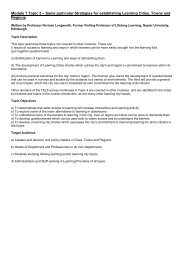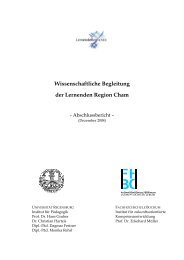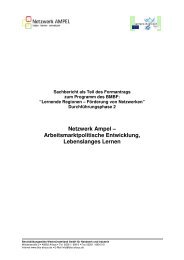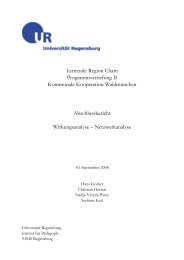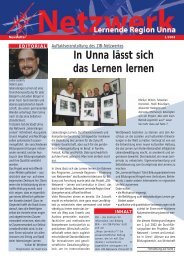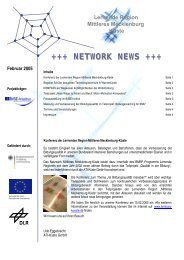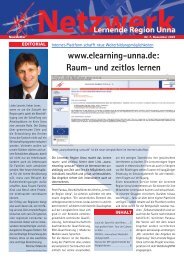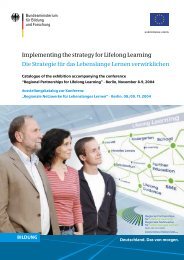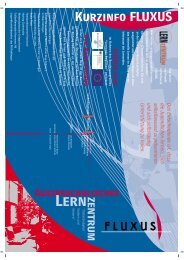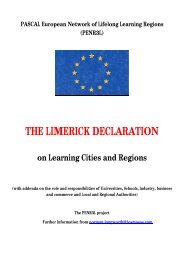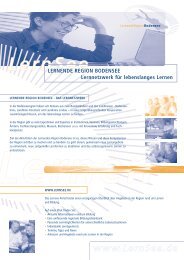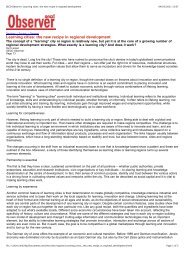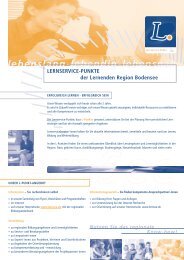SWOT-analysis as a basis for regional strategies - EUROlocal
SWOT-analysis as a basis for regional strategies - EUROlocal
SWOT-analysis as a basis for regional strategies - EUROlocal
You also want an ePaper? Increase the reach of your titles
YUMPU automatically turns print PDFs into web optimized ePapers that Google loves.
4.3 Social learning: actors and interactions in focus<br />
As w<strong>as</strong> argued above, social learning <strong>as</strong> an actor-oriented dimension of the <strong>SWOT</strong><br />
entails factors which can be seen <strong>as</strong> part of the process of accumulating social capital<br />
within the region in question. Even though no quantitative <strong>analysis</strong> h<strong>as</strong> been made in<br />
order to draw conclusions on the extent to which social capital in fact exists within<br />
these Nordic regions, some tentative conclusions can be drawn b<strong>as</strong>ed on the social<br />
capital accumulated <strong>as</strong> a result of the learning process.<br />
It can be <strong>as</strong>ked, <strong>for</strong> example, whether the actor-specific elements of the <strong>SWOT</strong> are<br />
likely to enhance and support resources which have a positive impact on institutional<br />
and organisational learning within the region, or whether they are potentially capable<br />
of influencing the way in which <strong>for</strong>ms of social interaction evolve within the region <strong>as</strong><br />
a whole (both within the private and the public sectors). 3<br />
To put it briefly, social learning used in this contaxt refers to the degree of internal<br />
<strong>analysis</strong> of the actor dimension undertaken in the <strong>SWOT</strong>. On the b<strong>as</strong>is of the<br />
<strong>as</strong>sessment of the <strong>SWOT</strong> <strong>analysis</strong> we suggest that the actors involved in the<br />
programming and implementation structure tend to overlook the need <strong>for</strong> internal<br />
<strong>analysis</strong> of the organisational structure itself, thereby leaving an important element of<br />
learning and improvement central to the whole <strong>SWOT</strong> methodology untapped. The<br />
factor most often referred to in terms of implementation structures and their potential<br />
<strong>for</strong> the accumulation of social capital h<strong>as</strong> been identified <strong>as</strong> the need to incre<strong>as</strong>e cooperation<br />
between universities and businesses, <strong>as</strong> can be seen <strong>for</strong>m the table below.<br />
Table 8. Elements of social learning<br />
PROGRAMME<br />
BLEKINGE<br />
GROWTH AGREEMENT<br />
(SWEDEN)<br />
VÄSTERBOTTEN<br />
GROWTH AGREEMENT<br />
(SWEDEN)<br />
NORRA NORRLAND<br />
OBJECTIVE 1<br />
PROGRAMME<br />
(SWEDEN)<br />
SOUTHERN SWEDEN<br />
OBJECTIVE 2<br />
PROGRAMME<br />
(SWEDEN)<br />
DENMARK OBJECTIVE 2<br />
PROGRAMME<br />
SOCIAL LEARNING<br />
-“Baltic dimension requires further <strong>regional</strong> co-operation”<br />
-Co-operation between universities and businesses emph<strong>as</strong>ised<br />
-The need to develop co-operation between municipalities identified<br />
-Need <strong>for</strong> new meeting places to support entrepreneurship<br />
-Need <strong>for</strong> co-operation between universities and businesses referred<br />
to<br />
-New meeting places <strong>for</strong> businesses and enterprises required<br />
-New <strong>for</strong>ms of young people’s participation<br />
-Need to strengthen co-operation between economic life and R&D<br />
-Need to profit from new organisational and working methods<br />
- Need to develop the connection between R&D and businesses<br />
-Sub-<strong>regional</strong> specificity taken into account in the five<br />
(sub-) <strong>regional</strong> <strong>SWOT</strong> analyses<br />
-Need <strong>for</strong> improved administrative co-ordination acknowledged, <strong>as</strong><br />
well <strong>as</strong> the threat of further centralisation within the public sector<br />
-SMEs and local activities in the rural are<strong>as</strong> identified <strong>as</strong> strengths<br />
3 The in-depth <strong>analysis</strong> of such issues is likely to raise research questions similar to those referred to by M<strong>as</strong>kell in<br />
his article (2000, 68), i.e. capabilities of enhancing inter-organisational co-operation; potential barriers and<br />
constraints to such co-operation; policies facilitating unlearning and whether they can be connected to knowledgeenhancing<br />
policies.<br />
49



